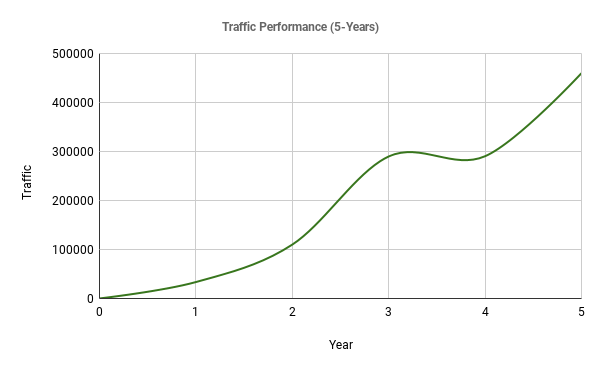
Increase enrolled students with a proven SEO strategy to promote visibility of your school and maintain a strong reputation.
We deliver innovative website, SEO, and content strategies – grounded in timeless marketing principles – to help all types of schools get in front of potential students and faculty (hiring).
The global education market is projected to reach $10 trillion by 2030, driven by technological advancements and increasing demand for quality education.
To capitalize on this growth, it’s essential for schools to establish a robust online presence through a well-designed website and effective SEO strategies. This approach enhances visibility, attracts prospective students and ensures your institution stands out in an increasingly competitive educational landscape.
A 2022 survey revealed that 60% of families said reviews from parents on school search and review sites influenced their decisions to enroll. This underscores the critical importance of a robust online presence for educational institutions. Implementing effective SEO strategies can significantly enhance visibility, drive targeted traffic, and convert inquiries into enrollments.
Why do schools need SEO?
Search Engine Optimization (SEO) is a cost-effective strategy for schools to enhance their online presence and attract prospective students. By optimizing their websites, schools can ensure they appear prominently in search engine results, making it easier for families to find and engage with them.
Prospective students and their families often use search engines to:
- Research educational institutions: Families look for schools in their area or those offering specific programs.
- Evaluate school reputations: They read reviews and testimonials to assess the quality of education and campus life.
- Explore academic programs: Detailed information about curricula, extracurricular activities, and special programs is sought.
- Understand admission processes: Information on application requirements, deadlines, and procedures is crucial.
- Compare tuition and financial aid options: Families assess costs and available financial support.
- Attend virtual tours and open houses: Online events and virtual campus tours help in decision-making.
A strong SEO strategy ensures that a school’s website ranks highly in search results, making it more likely that prospective students will find and consider the institution. Without effective SEO, schools may miss out on valuable opportunities to connect with potential students, leading to decreased enrollment and visibility.
What does a school SEO strategy look like?
Many think just building a website is enough for SEO and to rank well in Many think that simply building a website is enough for SEO and to rank well in organic search—but that couldn’t be further from the truth. It’s about creating assets (website, social media, etc.) that all work together to increase visibility for your school and its brand.
We can help you by focusing on the following areas:
- Technical SEO: Ensuring you have a technically sound website for your school, with fast load times, mobile optimization, and proper indexing by search engines.
- Content Strategy: Creating the right content to not only drive traffic but also convert prospective students and parents. This includes informative pages, blog posts, and resources that highlight your school’s strengths and offerings.
- Local SEO: Making sure your school appears prominently in local search results, so families in your area can find you when they’re looking for educational options.
- Reputation Management: Ensuring that when prospective students and parents are reviewing your school, they see the positive aspects you want to highlight (and mitigating any negative PR).
TechAudits can help you enroll more students.
Get started with managed SEO services today.
We help all types of educational institutions improve their reputation and get found via organic search.
K-12 Schools
Colleges & Universities
Online Learning Platforms
Tutoring Services
Trade Schools
Certification Programs
Educational Consultants
Language Schools
Test Prep Services
Have questions about working with an SEO company?
We have answers. The team behind TechAudits has been working in or around the education space for the better part of the last 10 years. We have experience working with educational consultants, speakers and test prep services.
We are certain that if you partner up with TechAudits you will see a strong return for all of the effort.
SEO is the practice of optimizing your online presence to enhance visibility in search engine results and attract targeted traffic.
You should expect:
- Sustainable Growth: SEO helps drive qualified, long-term traffic to your site, supporting sustained growth in enrollment.
- Targeted Traffic: Reach potential students actively searching for your services or course offerings.
- Cost-Effective Marketing: Establishing SEO as a marketing channel provides a strong return on investment compared to other advertising methods.
- Increased Brand Awareness and Credibility: High search rankings help build trust and position your brand as an educational leader.
SEO for higher education has unique considerations due to the nature of academic institutions and the competitive landscape of student recruitment. Here are some key ways SEO for higher education stands out:
- Local and National Focus: Many colleges and universities aim to attract both local and out-of-state students. SEO strategies must include both local SEO to reach nearby students and broader targeting for national or even international prospects, focusing on keywords related to location and degree programs.
- Program-Specific Keywords: Unlike general services, higher education SEO requires targeting highly specific keywords related to academic programs, degrees, and student services. Detailed content is essential to address questions about program offerings, faculty expertise, campus life, and career outcomes.
- Lead Generation for Enrollment: The primary goal in higher education SEO is to generate inquiries from prospective students rather than immediate sales. Effective strategies should include clear calls-to-action and optimized landing pages that guide prospective students to request information, apply, or schedule a campus tour.
- Reputation Management: Trust is essential in higher education, where decisions impact long-term career outcomes. Actively managing online reviews, testimonials, and maintaining a positive digital presence are crucial to establish credibility and attract students.
- Mobile Optimization: Prospective students, especially younger audiences, often search for schools on mobile devices. Ensuring a mobile-friendly website with easy access to program information, application portals, and contact options is essential for engagement.
By focusing on these areas, higher education institutions can tailor their SEO strategies to attract and engage students effectively, building a strong online presence that aligns with their recruitment goals.
Reputation management is essential for educational institutions due to the following reasons:
- Trust and Credibility: A positive reputation fosters trust among prospective students and their families, influencing their decision to choose a particular school or program. In education, where decisions impact students’ futures, families prefer institutions with a strong, reputable track record.
- Online Presence: With many families and students beginning their school search online, maintaining a favorable digital image is crucial. Positive reviews, testimonials, and success stories enhance an institution’s visibility and appeal.
- Competitive Advantage: In a competitive educational landscape, a strong reputation sets an institution apart from others. A positive online presence attracts more students, boosts enrollment rates, and helps the school stand out.
- Student Retention and Referrals: Satisfied students and alumni are more likely to refer others and return for additional programs or courses, contributing to ongoing growth and a positive community image.
- Crisis Mitigation: Effective reputation management allows institutions to address negative feedback promptly, minimizing potential damage and demonstrating a commitment to transparency and student satisfaction.
By actively managing their reputation, educational institutions can build trust, strengthen their market position, and ensure long-term success and growth.
Your optimization efforts will pay off, but the results may not be immediately visible. While you might notice some initial progress within a couple of months, significant changes — like climbing up the search rankings — often takes around three to six months.
An effective SEO strategy for higher education institutions will align with your goals, helping you maximize search visibility and reach more prospective students.
This strategy should make use of the following tactics:
- Keyword Research: It’s critical for colleges and universities to find the terms prospective students are using to search for programs, admissions, and campus life information. This includes both general terms and long-tail, geo-specific keywords that capture intent for specific locations or programs.
- On-Page Optimization: All elements of a school’s website, such as title tags, meta descriptions, headers, and content, should be optimized with relevant keywords while maintaining readability and user experience, ensuring that students and parents can easily navigate.
- Technical SEO: Technical issues can stop search engines from indexing your site, so it’s essential to ensure that the website is fast, secure, and mobile-friendly. This includes optimizing load times, fixing broken links, and using SSL certificates.
- Quality Content Creation: Authoritative and informative content that addresses common questions about programs, campus life, financial aid, and career outcomes can help improve search rankings and engagement. Blogs, FAQ pages, and resource guides can attract and retain prospective students.
- Link Building: Acquiring high-quality, authoritative backlinks from reputable educational websites, industry publications, and local communities can significantly boost a school’s search engine credibility and visibility.
- Performance Tracking: Use tools like Google Analytics and Google Search Console to monitor website traffic, user behavior, and conversion rates. Tracking these metrics helps you understand the effectiveness of your SEO strategy and identify areas for improvement.
- Continuous Improvement: SEO is an ongoing process. Continuously updating content, adjusting strategies based on performance data, and staying updated with search algorithm changes are key for long-term success.
By integrating these elements into a cohesive strategy, higher education institutions can strengthen their online presence, attract more targeted traffic, and ultimately convert that traffic into prospective student engagements.
An SEO agency for higher education institutions will guide you in identifying the most relevant metrics aligned with your recruitment and branding goals, allowing you to monitor the right KPIs.
Here are some common metrics used to gauge SEO success:
- Search Rankings: Track your institution’s search engine positions for targeted keywords related to degree programs, admissions, financial aid, and campus resources. This metric reflects the immediate impact of your SEO efforts on online visibility.
- Website Traffic: Analyze the flow of visitors to your site, particularly from organic search. Use tools like Google Analytics to gain insights into both the quantity and quality of visitors, as well as their behavior on your site.
- Inquiries and Applications: Monitor the number of inquiries or applications from prospective students generated through your website. Compare this figure to the baseline established before your SEO campaign began to measure growth and engagement.
- Conversion Rates: Assess how effectively your site converts visitors into leads, such as information requests, campus tour sign-ups, or application submissions. An increase in conversion rates indicates that your site is successfully attracting the right audience and motivating them to take action.
- Local and National Search Visibility: Measure your institution’s performance in local and national organic search results. It’s beneficial for higher education institutions to appear prominently on platforms like Google’s Map Pack and higher in search results for both regional and national audiences.
By keeping track of these metrics, higher education institutions can build a comprehensive picture of their SEO campaign’s performance and make data-driven decisions to refine their strategy and maximize ROI.
TechAudits has helped many brands establish their place in organic results, both local and national.
See how TechAudits has driven significant revenue and value for our clients by checking out our case studies.
Read Case Studies
Sources:
- https://www.niche.com/about/enrollment-insights/2022-niche-survey-of-parents-searching-for-k-12-schools/
- https://www.holoniq.com/notes/10-trillion-global-education-market-in-2030
- https://www.searchenginejournal.com/seo-for-higher-education/519354/
- https://www.seoptimer.com/blog/seo-for-higher-education/
- https://www.sixthcitymarketing.com/2024/04/05/higher-education-marketing-stats/
- https://www.hanoverresearch.com/reports-and-briefs/k-12-education/2024-trends-in-k-12-education/